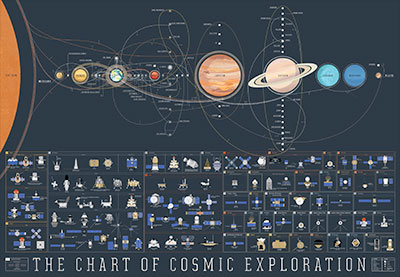|
|

|
|
Author
|
Topic: The Chart of Cosmic Exploration (Pop Chart Lab)
|
Robert Pearlman
Editor Posts: 42981
From: Houston, TX
Registered: Nov 1999
|
 posted 03-11-2016 07:54 AM
posted 03-11-2016 07:54 AM
   
Pop Chart Lab The Chart of Cosmic Exploration Probe the solar system from Mercury to Pluto with this stellar schematic of space exploration! From the Luna 2 in 1959 to the DSCOVR in 2015, this color-coded chart traces the trajectories of every orbiter, lander, rover, flyby, and impactor to ever slip the surly bonds of Earth's orbit and successfully complete its mission — a truly astronomical array of over 100 exploratory instruments in all. Featuring hand-illustrated renderings of each spacecraft juxtaposed against the serried giants of our solar system, this galactic survey is a testament to man's forays into the grand cosmic ballet. Each poster comes packaged in a Pop Chart Lab Test Tube. Using 100 lb. archival stock certified by The Forest Stewardship Council, this poster is pressed in Long Island City with vegetable-based inks.This print is available for preorder. Orders containing it begin shipping Tuesday, 22 March. |
Glint
Member Posts: 1040
From: New Windsor, Maryland USA
Registered: Jan 2004
|
 posted 03-11-2016 08:55 AM
posted 03-11-2016 08:55 AM
   
Nice chart. But I am sorry to see that the list excludes other missions that while slipping the surly bonds of Earth's orbit unfortunately did not successfully complete their missions. Examples would include the likes of Mars Observer and Apollo 13. After further study, I do not see the 1985 International Cometary Explorer (ICE) spacecraft that encountered Comet P/Giacobini-Zinner. For $38 I'd expect something more complete. |
cspg
Member Posts: 6210
From: Geneva, Switzerland
Registered: May 2006
|
 posted 03-11-2016 09:40 AM
posted 03-11-2016 09:40 AM
   
I thought that the New Horizons spacecraft performed a fly-by of Pluto. According to the chart, the spacecraft "orbited" Pluto and then went on to "orbit" Charon.This chart looks like a similar attempt by National Geographic a few years back and if I'm not mistaken both show the same inaccuracies (the design is to blame). |
Glint
Member Posts: 1040
From: New Windsor, Maryland USA
Registered: Jan 2004
|
 posted 03-11-2016 09:52 AM
posted 03-11-2016 09:52 AM
   
Same thing with Voyager II. According to the graphical representation, Voyager II orbited the four gas giants, one at a time, before drifting off.I was also surprised to learn that Pioneer 10 orbited Saturn's moon Janus, and perhaps Epimetheus too. There are many similar curiosities that may cause misunderstanding as a result of poor graphical presentation. Also, since they're counting missions to the Sun-Earth Largrangian L-1 point, they omitted the International Sun-Earth Explorer 3 (ISEE 3) as well. There are also some borderline cases that could or should have been included in my opinion. Although it may not have slipped those surly bonds, Geotail did reach a distance of more than 200 Earth radii -- way beyond the moon -- and interacted gravitationally with the lunar body. | |
Contact Us | The Source for Space History & Artifacts
Copyright 2020 collectSPACE.com All rights reserved.

Ultimate Bulletin Board 5.47a
|
|

|
 advertisement advertisement

|












